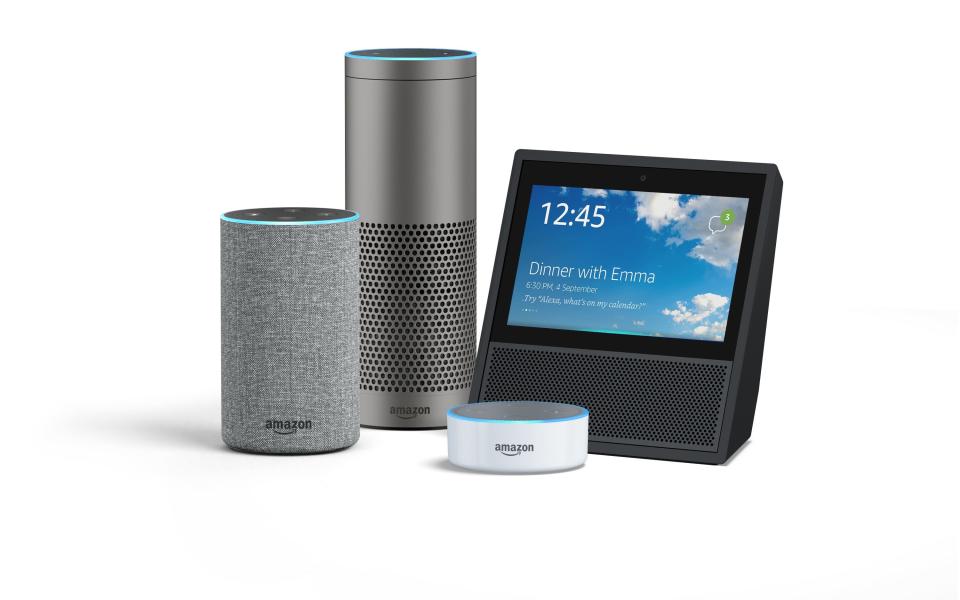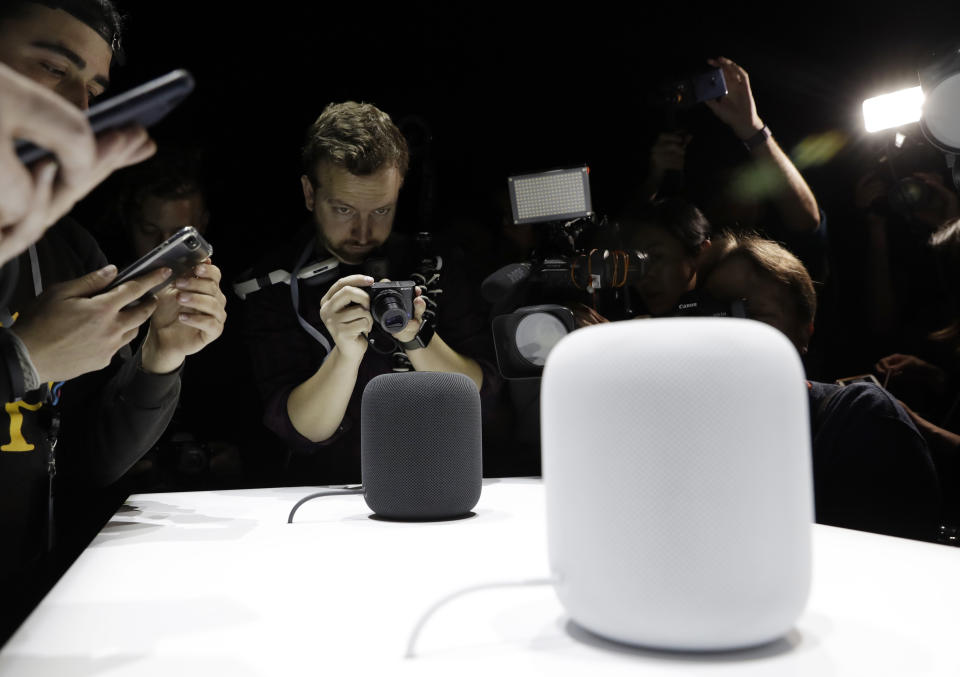What Amazon’s Echo is doing to stay ahead of the competition
Amazon (AMZN) didn’t invent the modern-day voice assistant, but that doesn’t seem to matter to the tens of millions of people who now own an Echo in their homes.
Since the Seattle tech giant rolled out the first Alexa-enabled speaker in 2015, the sleeper hit has become the undisputed market leader and in the process, contributed to Amazon’s selection by Yahoo Finance’s editors as 2017’s Company of the Year. (See our timeline for Amazon’s path to domination in the past year.)
According to eMarketer, the Echo cornered roughly 70% of the U.S. market for voice-controlled speakers this year, eclipsing competitors like Google Home, Microsoft Cortana and Apple’s Siri, to the point at which “Saturday Night Live” aired a geriatric-themed Echo spoof in May.

Over the next 12 months, Amazon says more skills for the popular voice assistant are coming focused on letting shoppers do more on Amazon.com simply using their voice. That’s good for the tens of millions of Echo owners and Prime users in the world today, but as is frequently the case, also good for Amazon’s bottom line. And, as the Echo becomes more ubiquitous, particularly in business settings, Amazon may be compelled to reassure users that the home assistant isn’t invading their privacy.
Amazon says the cloud is the key to Alexa’s success

The Echo’s success as a voice-controlled speaker is undoubtedly impressive, and the key to America embracing Alexa in their homes was making Alexa cloud-based, contends Dave Limp, Amazon SVP of devices and services.
“We envisioned Alexa and all the products that connect to her to be based mostly in the cloud, and I think that’s the kind of paradigm shift that we’ve seen with this technology as opposed to previous technologies in consumer electronics, because Alexa being up in the cloud allows us to improve her every single day,” Limp told Yahoo Finance at Amazon’s Seattle headquarters recently.
Limp added: “And because developers can extend her through software skills and through hardware partners, you’re seeing her now in refrigerators and cars and baby monitors and cameras. The momentum just continues to build throughout the year and I think we’ll see it continue into 2018 as well.”
Unlike Apple (AAPL), which keeps Siri under lock and key, Amazon early on opened up access to Alexa so outside companies and developers could develop functions for it, even integrate it into their own devices. It was a risky business move, but ultimately a savvy one. At last January’s Consumer Electronics Show, Alexa was the breakout star, with hundreds of Alexa-enabled devices from outside parties — fridges, air purifiers, self-driving cars, even baby monitors — lining the convention halls en masse.
What’s next for Alexa
For now, interactions with Alexa are a start-and-stop affair where users instruct it to perform one or two of more than 25,000 different tasks: telling you the latest news, cracking a sassy joke, calling an Uber or playing the latest Ariana Grande album off Amazon Music or Spotify.
But what Alexa can’t do is hold a rich, lengthy conversation that picks up on things like cues and context. “I can barely hold a 20-minute conversation, so you can imagine how hard it is for technology,” Limp quips.
Getting to that point will require a lot of work from 5,000 or so Amazon employees who now work on Alexa in places as far-flung as Germany and India, as well as outside developers. Perhaps realizing that making Alexa a conversational whiz was a herculean task, Amazon shares Alexa’s software development tools with third parties to create tasks, or “skills,” of their own.
In 2015, Amazon announced the Alexa Fund, a $100 million venture capital fund that gives cash to companies and developers who drum up new skills that let Alexa perform new tasks.
For Amazon, all these efforts — sharing software tools with third parties, the fund and student competitions — are a means to an end. The more Alexa-enabled devices there are in the world, the more people interact with Alexa. And the more engaging Alexa becomes, the more likely they are to use Amazon’s wide array of services and order things.

Those efforts may also help stave off competition like Google Home, Microsoft’s (MSFT) Cortana and Apple’s Siri, which is already usable on Mac computers and arrives loaded on the HomePod — Apple’s (AAPL) answer to the Amazon Echo — when the speaker arrives some time in 2018.
Ask Limp about the growing competition, and he’ll contend Echo continues to distinguish itself in the way it interacts with users.
“Some of those assistants are very different,” Limp says. “They’re focused on one-to-one interaction with a person themselves, usually on the phone, and that’s not what we’re trying to do with Alexa. We’re trying to do something very different. It’s in a home setting — it’s very communal.”
The Amazon executive also says the Alexa team pays serious attention to feedback from Echo owners. Case in point, in early December, the team rolled out a new Alexa “skill,” or task, that lets people use their voice to set an alarm that wakes them up with music. One Echo customer requested that feature roughly a year ago, Limp says.
‘Privacy can’t be bolted on as a last feature’

Another potentially big area of opportunity in the coming months? Alexa for Business, which the tech giant announced at Amazon Web Services’ re:Invent conference this November, and lets businesses bring the voice assistant into the office so entire teams or offices can use it. In addition to setting reminders, managing schedules and ordering office supplies, Alexa is now capable of simplifying certain office tasks.
“I walk into the conference room, and all I say is, ‘Alexa, start the meeting,’” Limp explains. “The cloud knows which meeting it is, which attendees, which A/V [audio-visual] system to set up, and it all just automatically gets set up.”
While businesses like Capital One (COF), Brooks Brothers and WeWork have already signed up as clients, one business Yahoo Finance spoke under the condition of anonymity said it was evaluating Alexa for Business but expressed privacy and security concerns, because Alexa is allegedly “always on” and “always listening” to what’s going on in a room. According to a report from The Information in July, for instance, Amazon was thinking about giving developers access to raw transcripts of users’ interactions with Alexa — a report Limp vehemently denied to Yahoo Finance.
Limp acknowledges that security and privacy remain a valid concern but contends Amazon has its bases covered on that front, whether it’s having a Mute button on the device or that blue ring that turns on once Alexa is listening.
“Privacy can’t be bolted on as the last feature you would put into this,” he says. “From the very beginning, we thought about privacy as a foundational element. Alexa isn’t always on. All she’s listening for is that wake word [Alexa], and that’s local. Nothing is going to the cloud, and secondarily, once we do start streaming to the cloud, we make it very clear to everyone in the room by that circle of light that, hey, right now we are streaming up to the cloud. That’s critical. Because without that user interface, you would never know.”
Despite Amazon’s efforts, privacy will likely remain a concern with devices such as the Echo as they become more successful and ubiquitous.
Click here to read more about the work culture at Amazon.
—
JP Mangalindan is the Chief Tech Correspondent for Yahoo Finance covering the intersection of tech and business. Email story tips and musings to [email protected]. Follow him on Twitter or Facebook.
More from JP:
Facebook targets 6- to 12-year-old demographic with Messenger Kids
Intuit CEO: Old-school accountants will be ‘struggling in 5 years’ because of A.I.
How Amazon quickly trains 120,000 employees for the holidays
Why the Russia ad scandal could actually be a win for Facebook
RBC analyst: Only 2 scenarios would spur investors to flee Facebook
LEAKED AUDIO: New Uber CEO Dara Khosrowshahi reveals 3 things employees should know about him

 Yahoo Finance
Yahoo Finance 